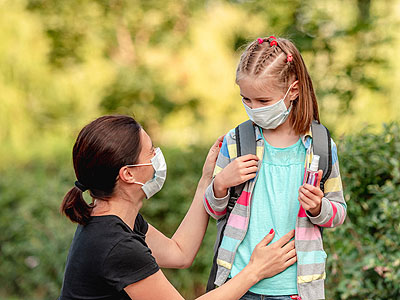-
The Anxiety of Returning to the Classroom and the Workplace
- Posted on August 18, 2021
- by admin
- in All Articles, Mental Health, NFSB Blog
- Comments Off on The Anxiety of Returning to the Classroom and the Workplace
 Humans adapt to the environment around them. When society was blindsided by the COVID-19 pandemic, people adapted. Children learned virtually and anyone who could work from home did so. People used different coping skills to adapt to a lifestyle spent mostly at home.
Humans adapt to the environment around them. When society was blindsided by the COVID-19 pandemic, people adapted. Children learned virtually and anyone who could work from home did so. People used different coping skills to adapt to a lifestyle spent mostly at home.As students return to school and adults return to work, many for the first time since the start of the pandemic, a certain level of anxiety could be making the transition more difficult.
“Many people who have spent most of the last year-and-a-half at home haven’t had to deal with a crowd of people and their personalities,” said Staela Keegan, MSW (Master of Social Work), LCSW (Licensed Clinical Social Worker), LCADC (Licensed Clinical Alcohol and Drug Counselor), and Clinical Director at NFSB. “This can be extremely anxiety-provoking for people who have adapted to a more peaceful, at-home lifestyle.”
For those who have mental health disorders like anxiety or depression, staying home provided them with a sense of security and comfort, but it also fed their illness.
For example, if someone had anxiety about being out in public prior to the pandemic, isolation has not helped. Returning to the appropriate baseline of functionality will be far more difficult today because they’ve been allowed and often encouraged to remain isolated at home.
While adults at least have the life experience to remember what it was like to be around other people, think about young children who might be returning to the classroom on a full-time basis after spending more than one year learning virtually or in a hybrid model. Many kindergarteners didn’t go to school so first grade will be a new experience.
“Children pick up their parents’ anxiety,” Staela said. “Parents need to be aware of their own anxiety, have open conversations about returning to school, and offer reassurance and encouragement. Kids need to socialize. They learn by observing and interacting with others. It’s important for parents to encourage this behavior and put kids’ minds at ease.”
This can also be an awkward time for adolescents dealing with anxiety, depression, and other mental health disorders. At this age, kids are often more connected with friends than family. Not being able to interact with friends, except through technology, has made the pandemic difficult for the adolescent population.
“We’ve seen kids ages 11-15 having anxiety about not just school, but the world around them,” Staela said. “Many don’t know where they fit in. Parents need to support kids in this age group so they feel more comfortable returning to the classroom.”Coping with Change
NFSB has been seeing Amy*, a youth who spent freshman year of high school learning remotely and will now be entering a school environment for the first time as a sophomore. Amy was unable to maintain pre-pandemic friendships and feels isolated.To make matters worse, Amy’s mother was pushing her to get out of the house and see friends. Amy, however, wanted to take the time at home to relax because of the anxiety that lies ahead when school starts. We’re using individual and family therapy to work through these issues.
“When the parents’ agenda is different from the teen, it’s important to listen to the child,” Staela said. “Teens are emerging adults. While parents should guide them, forcing relationships upon them isn’t helpful. If this child feels better about taking the summer to connect with friends on social media until she feels comfortable socializing in person, that’s okay.”
At NFSB, we try to identify the cause of an individual’s fear or anxiety and whether those feelings are realistic and backed up by facts. Then we’ll often create a goal and smaller, weekly objectives to pursue on the way to achieving the larger goal.
For example, if you’re anxious about returning to work or school, what small thing can you do that will help you feel a little better about being around people again? Visit a friend? Go to a store? Attend a family gathering? The idea is to take an incremental approach instead of trying to resolve a problem overnight, which is unrealistic.
Keep in mind that entering therapy doesn’t always mean you’re making a long-term commitment. The earlier you start, the faster you’re likely to see progress.“We sometimes provide people with what amounts to a mental health ‘tune-up’ to address a minor problem and get back on track in a short period of time,” Staela said. “The most important thing to remember is that mental health is just as important as physical health.”
*Pseudonym
If you or someone you know is anxious about returning to school or work, don’t wait to see if things get better on their own. Take steps now to improve your mental health and contact us.
If you enjoyed this article please consider sharing it!

















